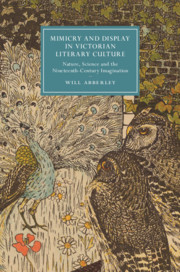 Mimicry and Display in Victorian Literary Culture
Mimicry and Display in Victorian Literary Culture Crypsis versus Individualism in Fin-de-Siècle Cultural Criticism
Published online by Cambridge University Press: 16 May 2020
Chapter 5 contends that crypsis acted as a versatile trope by which fin-de-siècle literary and cultural critics thought through and complicated ideals of self-expression and originality. The critics discussed often invoked animal crypsis as a figure of conformity and bad faith, the opposite of authentic, autonomous expression. Such cryptophobic individualism is traced through the work of Lesley Stephen, Theodore Watts-Dunton, Walter Pater and Oscar Wilde, and its contradictions examined. Although the trope drew on the imagery of adaptive appearance, its ideal of authentic expression was incongruent with the latter’s semiotic logic. Further, several of the authors discussed worried that too much discursive individualism and authenticity would threaten social cohesion. Stephen’s and Watts-Dunton’s religious and literary criticism attacked cultural imitation and protective mimicry while fearing that their removal might presage violent revolution or degeneration. Walter Pater, conversely, concluded that all art was inherently mimetic, reworking elements from pre-existing sources. He suggested that individualism was attained by mixing eclectic influences, generating novel combinations. It would take Pater’s pupil, Oscar Wilde, though, to fully realise the radical implications of such mimetic individualism. His vision of artistic authenticity required eluding recognition so that, paradoxically, the artist truly stood out by blending in.
To save this book to your Kindle, first ensure [email protected] is added to your Approved Personal Document E-mail List under your Personal Document Settings on the Manage Your Content and Devices page of your Amazon account. Then enter the ‘name’ part of your Kindle email address below. Find out more about saving to your Kindle.
Note you can select to save to either the @free.kindle.com or @kindle.com variations. ‘@free.kindle.com’ emails are free but can only be saved to your device when it is connected to wi-fi. ‘@kindle.com’ emails can be delivered even when you are not connected to wi-fi, but note that service fees apply.
Find out more about the Kindle Personal Document Service.
To save content items to your account, please confirm that you agree to abide by our usage policies. If this is the first time you use this feature, you will be asked to authorise Cambridge Core to connect with your account. Find out more about saving content to Dropbox.
To save content items to your account, please confirm that you agree to abide by our usage policies. If this is the first time you use this feature, you will be asked to authorise Cambridge Core to connect with your account. Find out more about saving content to Google Drive.